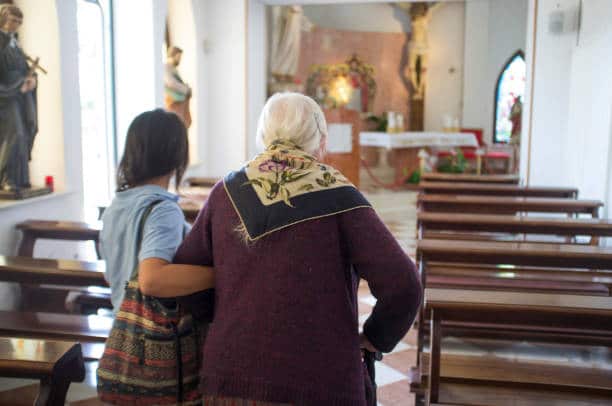
Jenan Taylor
23 June 2022
Pastoral carers need to be equipped to provide dementia-friendly worship for people with dementia, according to a Gisborne priest.
St Paul’s Gisborne vicar, the Reverend Dennis Webster said dementia-friendly church services were important for people with dementia, the church and the community.
But Mr Webster said pastoral carers needed to be trained and supported to respond to those needs.
He said Gisborne parish had provided dementia-friendly services to a local aged care provider before the pandemic.
He said the prayers and songs the church had provided the dementia residents with at those services had sparked recognition and they had been able to participate.
Mr Webster said with the number of Australians who live with dementia soaring, and a strong retirement population being forecast for the Macedon Ranges shire within the decade, he had been considering how the parish could adapt services for people in the community.
According to Dementia Australia, there are an estimated 487,500 people with dementia in 2022 and the number is forecast to rise to 1.1 million by 2058. It said about 70 per cent of them lived in the community.
Mr Webster said about five of his parishioners had dementia, and one was occasionally helped to come to church by friends.
He said she sometimes expressed unusual behaviour, but that that was to be expected.
Practitioners needed to be patient and aware of the nuances of different types of cognitive decline.
Read more: Accessibility not a ‘matter of special privilege’: Culhane
“As clergy you just need to be mindful that you may get the occasional inappropriate remark back,” Mr Webster said. “It’s a matter of loving them. Jesus looked at us and loved us. And that’s what we’ve got to do.”
He said St Paul’s in Gisborne had an intentional visiting program for another parishioner with dementia that involved a group of people being rostered to provide him with aged care ministry on a rotational basis every Tuesday.
Aside from being able to share hymns and prayers with him, another benefit was that his carer received respite because of that visit, Mr Webster said.
He said he wanted to create an awareness that instead of overlooking people with cognitive decline, the Church could act to enable lay and ordained people to better respond to their needs.
He said it was important for churches to consider programs like their intentional visiting initiative and to equip volunteers and professionals to be able to respond well in any situation involving dementia.
Having a general awareness was not enough. “I do think we need to actually provide some sort of support mechanism for our clergy and lay ministers as they go into these environments,” Mr Webster said.
Gisborne lay minister Janine McDougall helped the church’s aged care efforts and had received specialist dementia training through Baptcare some years ago.
Ms McDougall said it was important that churches who wanted to hold general services that were inclusive of people with dementia consider making parts of the services dementia-friendly.
She said it might include using readings and materials that were less wordy and encapsulated a more sensory experience or having shorter attendance times for them.
St Dunstan’s in Camberwell used to provide dementia-friendly services at the church every Thursday until the pandemic.
Warden John McKenzie said buses would bring people to the church from various facilities and they would also get refreshments.
Mr McKenzie, who used to be a chair on the board of Benetas, said he thought that people with dementia who were in the community or in aged care facilities would appreciate and benefit from being able to get back to those types of services, if they could.
“There are so many older, single people, and church is a community that’s important to them,” he said. “We know that when lockdowns were over, the attendances were up and people wanted to get back to them because so many missed out on the fellowship and the community that you get there as a member of a church.”
For more faith news, follow The Melbourne Anglican on Facebook, Twitter, or subscribe to our weekly emails.






